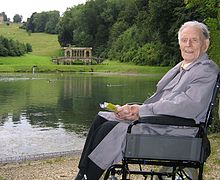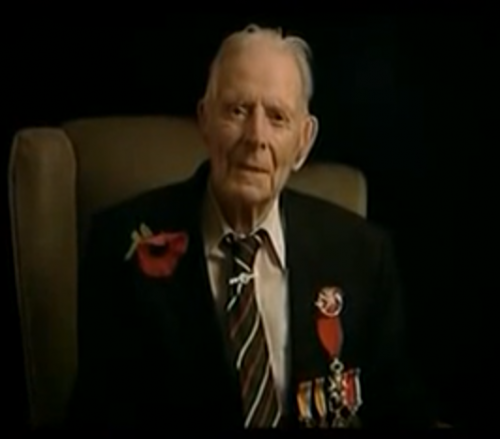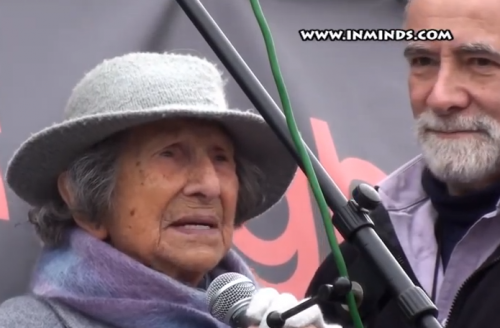For as long as I can remember I have considered middle age to be fifteen years older than I am. When I was five, twenty was definitely middle-aged. At twenty, middle age clearly began at thirty-five and by the time I reached thirty-five, middle age was obviously around fifty. Old was always beyond that fifteen year point. Over the past decade, since I returned to London, I have been lucky to spend a lot of time with vibrant, dynamic, physically and mentally active people in their 90s and beyond. This helped confirm my assumption that my middle age was yet to come. So it came as a shock when I heard on the radio last week that, for the administrative purposes of the remnants of what was once Britain’s fabulous National Health Service, I am now officially old. With that new label, come certain assumptions.
Britain, having just survived a referendum in Scotland on whether to break up the so-called “United” Kingdom, is now in the run up to a General Election in which, for the first time in history, nobody has a clue about the outcome. The political geography of the country has disintegrated, the kingdom has never been less united and the media, 95% Conservative, are in full swing desperately trying to scare people against voting for anything other than the Conservative Party. Right now, most would rather vote anything but Conservative.
Traditionally statistics show more older voters vote and they favour the Conservatives, making it crucial for this government to harvest their votes. Statistics also reveal that growing alienation and disempowerment among younger voters discourage them from voting and make them likely to vote against the Conservatives if they do. So there seems little point in attempting to woo them.
Many unpopular leaders, including George Bush(es), Margaret Thatcher, Tony Blair and Vladimir Putin, have deployed a sure-fire strategy to rally the populace behind hated governments: declare war and appeal to patriotism.
To whip up a decent war requires as a minimum: an enemy to fear, dehumanise, demonise, target and punish – the “baddies”; allies to lionise and reward – the “goodies”; intelligence and propaganda.
With overseas wars like Iraq, Afghanistan and Libya out of public favour, a new arena was required. Where better than the home front? With the same promise that after the war there would be “nation building,” aka the awarding of vast amounts of public money to private contractors, the propaganda machine (the media) moved into gear and the war was on. Though maintaining minor skirmishes on the traditional battlefronts of race and immigration, this May’s major election battle is portrayed as war between the generations.
Battle lines are now drawn up.
Propaganda is working overtime. “The old have worked hard, paid their taxes, built up the country and deserve the best in their old age.” By contrast, “the young are not working, have not earned or paid and are trying to fleece the country.” In short, “old = worthy and deserving, young = feckless and undeserving.”
War propaganda needs heroes to revere. Intelligence (pollsters and focus groups) suggest the ideal would be a man who is old, worked all his life, paid his taxes and could even be portrayed as a war hero. Intelligence, usually based on the world view of Conservative politicians who went to expensive private schools and still carry the torch for social attitudes I considered pre-historic when I was at school in the 1950s, then decided that propaganda could build on the Conservatives’ reverence for past wars. The approaching centenary of World War I, viewed by many Conservatives as a glorious moment in British history, was bound to provide opportunities for flag waving and hero worship.
But it was not plain sailing. From around year two of World War I, British popular belief has been that it was a disastrous mistake in which millions of young men were conned into fighting and dying for their country while their social superiors looked on, commanded from a safe distance and then portrayed themselves as heroes. Counter propaganda was required.
Step forward Michael Gove, whose short career as Minister of Education was distinguished by earning votes of no-confidence from all three main teaching unions. He launched the campaign in 2012 by attacking the generally accepted view of World War I as an unmitigated disaster in which young men were persuaded to lay down their lives so that the privileged could reap yet more benefits. Attacking a distinguished Cambridge University history professor in The Daily Mail, a newspaper that makes Conrad Black and Barbara Amiel’s “journalism” look the scribblings of revolutionary socialists, Michael Gove wrote:
‘Richard Evans may hold a professorship, but these arguments, like the interpretations of Oh! What a Lovely War and Blackadder, are more reflective of the attitude of an undergraduate cynic playing to the gallery in a Cambridge Footlights revue rather than a sober academic contributing to a proper historical debate.”
And Gove’s derision for peace poets, rather than patriotic war poets was scathing.
With great fanfare the Government announced a £50 million programme to fund travel for all British secondary school students (11-16) to view WWI European battlefields and cemeteries. This, presumably, was intended to win over the young, based on the assumption that the old already felt a warm glow of pride when looking back on “our glorious war history.” The programme has since been quietly scaled back to “two pupils and one teacher from every state funded secondary school in England.” Nobody seems to know whether any have actually been.
Propaganda, assuming the brave “Tommies”– as the foot soldiers were known– would be proud of their war service and chance to serve king and country, then sought out survivors of the war, particularly the last few active combatants, to use as role models by getting them to share their reflections. The process started in the late 1980s when the BBC made Veterans, a documentary.
This cunning plan, like so many caricatured in a century of literature, poetry, film and TV about WWI, unfortunately carried a series of flaws.
The oldest surviving Tommy, Harry Patch, who died in July 2009 at the age of 111, like so many of his contemporaries, had never talked of his war experiences and would probably have died without doing so, had he not been invited to take part in Veterans. He quickly made clear he had never forgiven the government which conscripted him and put him into a position where they expected him “to shoot a man I never knew, whose language I couldn’t speak. All those lives lost for a war finished over a table.” He described how, inspired by his understanding of the Ten Commandments, including “Thou shalt not kill,” when finally face to face with an armed German, he could not bring himself to shoot to kill. Instead he shot him in the shoulder, making him drop his rifle, and in the leg so he could not chase him. In 2007 at a Flanders war cemetery he recalled “I had about five seconds to make the decision. I brought him down, but I didn’t kill him … Any one of them could have been me. Millions of men came to fight in this war and I find it incredible that I am the only one left.”
Propaganda carefully manipulated Harry and his past at memorial events. Media coverage referred to his bravery. Comments he made were strategically edited to eliminate criticism for past, present and future confrontations. Fortunately documentary-makers rejected the pressure to present this positive spin and Harry became one of the anti-war movement’s strongest advocates, his credibility boosted.
The government struggled to find positive role models, survivors proud of their involvement in the greatest international bloodbath ever. Attending Remembrance Day ceremonies and interviewing people who were wearing medals showed most attending out of loyalty to and in remembrance of fallen comrades. Although the military, military historians, descendants of majors and generals, and government portrayed the war as a glorious chapter from our past, other than Conservative politicians, there seemed little support for the government line. Michael Gove tried to modify the state secondary school curriculum in history and English literature, replacing 20th Century literature with classics, running up to the end of the 19th Century and ignoring the rest of the world. That should have eliminated pesky negative references to World Wars I and II. But the public mood was becoming clearer. When, last year, David Cameron announced a programme of events to “celebrate World War I,” there was public outcry. It was only a matter of hours before he corrected that to “commemorate World War I.”
Rousing pomp and ceremony, supposed to be part of on-going celebrations, sorry, commemoration, of the four years of World War I, was quickly replaced by quiet reflection. Films, plays, documentaries, radio and television drama series all seemed determined to lay the lie and there have been and continue to be some outstanding portrayals of real people’s lives on both the “home front” and “battle front.”
Government, having got it wrong on our glorious past, shows itself equally out of touch with the real concerns of older and objectively old people. With the non-wealthy young, for the first time since the 1940s, faced with the prospect of ending up heavily in debt if they have the effrontery to try and get an education, the old are being viewed increasingly as selfish, having taken all the money. Government counter attacks that the old were prudent and hard-working, and all the young need to do is follow their example to enjoy all the benefits that have accrued to today’s pensioners. The latest manipulated statistics show an upturn in the economy, with the government claiming we are now back where we were before the 2008 crash. However, even using its own heavily manipulated figures, it cannot hide the fact that while the rich have got very much richer, the middle classes are treading water and the under 35s are still ten per cent worse off than they were in 2007 and, given the tripling of university tuition fees to £9,000 per year, they are likely to suffer further deterioration indefinitely. In response, government repeats its mantra that the young are lazy, unmotivated scroungers seeking public hand-outs and has announced a series of welfare cuts targeting the young while boosting benefits the old enjoy.
The selfishness of the elderly thus becomes viewed as a major obstacle to the advancement of the young. Or it would, if it were true. While politicians continue to pursue this new inter-generational divide, many older people lament, not the fecklessness of youth or its undeserving nature but the fact that young people no longer have the opportunities that so many older citizens were able to enjoy during the 1950s, 60s and 70s. Individually old people are not in a position to redress the dramatic societal imbalances which have arisen over the last two decades, turning Britain into the third most unequal society in the OECD (after the USA and Mexico) but many would like to see government tackle that challenge.
It’s not just the young who suffer. Using similar vocabulary, all the main political parties claim to be committed to furthering the interests of “hard-working families” while statistics show many hard-working families now on such low incomes that they depend on income supplements, food banks and hand-outs to cover rent, household and food costs. Job growth, vaunted by government as being the highest in Europe, is largely illusory. Earnings are still below 2008 levels. Zero hours contracts, where workers are contracted to be available for work but then neither called to work nor paid, allow them to be eradicated from unemployment statistics. One young man interviewed on TV recently described how, when he told an employment adviser he was interested song-writing, he was sent on a one-day, small-business-management course, taken off benefits and told he was a self-employed song-writer. Over a six-month period he managed to earn £50 (less than $100).
Among political parties, only the Greens (currently with one MP) have a clear commitment to helping the young. And the response of the elderly to this? When interviewed many state clearly they believe the situation is scandalous but despair about what can be done to help the young.
Universal adult suffrage (for 21-year-olds) in Britain dates back only to 1928. Nonagenarians and centenarians remember the battles to achieve it and how important it was when it finally happened. Many worry that the young, like them, feel disenfranchised by the voting options facing them.
A corollary to the constant message that the old tend to vote whereas the young tend not to, is that the elderly are naturally conservative, synonym for Conservative. Many people now in their eighth, ninth and tenth decades remember with horror life before the modern welfare state in 1945. They recall people unable to afford clothes or shoes, of not being able, like my own mother, to complete secondary school because they could not afford the fees. They remember the slumlords whom waves of social housing built during the 1940s, 50s, 60s and 70s effectively stamped out, and they are horrified at their return. Many anticipate with dread the future that awaits them if they cease to be able to care for themselves: local authority care now scheduled in 15-minute slots with people sometimes being allocated only one or two slots per week; care homes owned by private equity companies and changing hands every few months; local authority residential and care homes sold to private developers, then closed so the sites can be redeveloped. They also know propaganda can switch targets rapidly. They could become the new enemy, “bed-blocking, healthcare demanding, resource consuming, undeserving old.”
When all else fails, there is always the fallback position. Blame immigrants. The country’s woes are due to waves of alien hordes invading our fragile shores, appropriating our resources, taking our jobs and stealing our benefits. Statistics show a very different picture…Immigrants certainly come to Britain and take jobs. Leaving aside the “good immigrants” — merchant bankers, hedge fund managers, Mark Carney, Canadian Governor of the Bank of England, Moya Greene, Canadian head of Royal Mail (where, fresh from heading Tim Hortons, she tripled the cost of post and decimated the service, although it’s still vastly better than Canada Post)–statistics are unambiguous. Immigrants are a net benefit to Britain financially and use fewer public services resources per head than non-immigrant populations. But the c/Conservative message is clear. We need to resist the flood of immigrants washing up on our shores. So all major political parties have, to a greater or lesser extent, been sucked into parroting the anti-immigrant rhetoric of UKIP, the United Kingdom Independence Party, an ultra-right-wing party devoted to extracting or rescuing Britain from foreigners, especially the evil European Union which they claim is dumping its undesirables on us. All major parties claim to be committed to stemming the flow. And the hysterical pitch of the hyperbole rises constantly.
Propaganda portrays the elderly as being at great risk. Cowering in their homes, fearing marauding hordes, particularly East Europeans, it is the old who are vulnerable and endangered. Except, once again, statistics show something else. As pay for jobs in elder care drops, the work is taken on by these very marauding hordes, many of whom are appreciated, even loved by the “vulnerable” elderly. Without these immigrants, it is unlikely there could be a care system or health service at all.
Politics in Britain has been taken over by big business interests, especially the banks and accountants (now rebranded as wealth managers). Politicians are increasingly in thrall to the hedge funds that buy up our hospitals, schools, care homes. Companies dictate policy, as do Russian oligarchs and Middle-Eastern oil magnates. They have turned London into the money-laundering capital of the world, where dirty money is quickly turned into property assets, no questions asked. With prices soaring, these prime properties are then kept empty, a slap in the face to the increasing numbers of domestic homeless. Policy differences between major political parties have become almost indiscernible. And some of the sternest critics of the lack of serious choice are the oldest citizens of this country.
Just weeks before her death at the age of 108, eighteen months ago, my close friend Hetty Bower, addressed the Labour Party annual conference. With tears in her eyes she told a large audience she would never forget the choices that faced families before the welfare state, whether to spend money on bread or pay for a doctor to visit a sick child, and she never wanted the country to go back to that. One month earlier, she had addressed the annual Hiroshima Day ceremony and called for the government to scrap the £20 billion renewal of Britain’s Trident nuclear warheads and spend the money on healthcare, education and peace instead. And her last words, when she died wagging her finger in November 2013, were the refrain from the 1950s protest song, The H-Bomb’s Thunder, “BAN THE BOMB FOR EVERMORE.”
Among old people, Hetty was not alone in expressing her views. For the previous decade she lived in a wonderful home where many fellow residents, not all as fit as her, shared her opinions. The media use the term “conservative” as a synonym for reactionary. A lot of old people are differently conservative. They want to conserve the best of the social advances made over the last hundred years, advances to which they were proud contributors. It is young, for-sale politicians who are denying them their conservative wishes.
So, ignoring officialdom, as I approach middle age (now scheduled for 80) I can only hope some conservative elderly campaigners will stand up and speak for my generation and my rights. I will commit myself to doing the same for the generations for whom middle age is still more than 15 years ahead.
Listen to Hetty Bower singing her final words, four months before she died.


